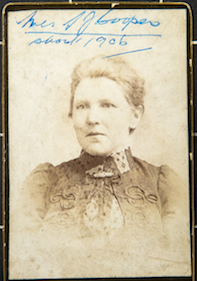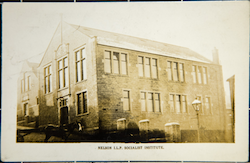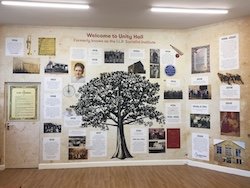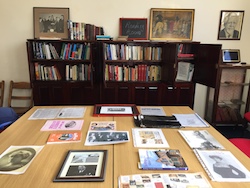It’s been a long, hard journey for the Selina Cooper project team in Nelson, from a dusty archive in the local library to a long-delayed public launch at one of the town’s oldest buildings. But with Covid restrictions finally easing, their struggle to commemorate the area’s proud socialist history is finally coming to fruition.
 Kevin Webb can clearly remember the moment he knew his efforts to revive the memory of a long-forgotten socialist icon would not be in vain. It was autumn 2019, 18 months since he and brother Gary had stumbled across a set of display boards in the archive at Nelson town library telling the life story of local suffragist and ILPer Selina Cooper (left).
Kevin Webb can clearly remember the moment he knew his efforts to revive the memory of a long-forgotten socialist icon would not be in vain. It was autumn 2019, 18 months since he and brother Gary had stumbled across a set of display boards in the archive at Nelson town library telling the life story of local suffragist and ILPer Selina Cooper (left).
The Webbs had recently visited the restored Unity Hall in the centre of their east Lancashire town and knew immediately it would be an ideal site to exhibit the re-discovered material that had languished so long out of public view. The hall, recently renovated and re-opened by Nelson town council, was for many years known as the Socialist Institute, headquarters of the local Independent Labour Party, and Cooper (left) was one of two women who had laid the foundation stone in July 1907.
Fast forward 18 months to that moment in autumn 2019. That’s when the brothers received news that their third application to the Heritage Lottery fund, submitted through Nelson council, had been successful. They had been awarded £50,000, not just for their display, but for a full-blown project celebrating the town’s socialist history and Cooper’s life as a tireless campaigner for peace, equality and women’s votes.
“The history of the rich and powerful is usually well documented while the history and achievements of working people is forgotten and uncelebrated,” says Kevin, who wrote the funding applications.
“One of the things we wanted to achieve was to make sure this particular piece of working class history was not forgotten and the achievements of Selina, plus the history of the Unity Hall and what it meant to local people, were commemorated in an appropriate way.”
Pandemic delays
The celebrations didn’t last long, however. Plans for a project launch in spring 2020 were soon scuppered by the coronavirus pandemic as the hall was forced to close and commemorations put on hold … until now, that is.
With Covid restrictions easing, and the hall due to re-open to the public, the long-awaited public launch event is now set for Saturday 26 June.
 It will be quite a day for the Webbs, and project facilitator Charlotte Bill who was appointed last summer. Despite the pandemic and all its associated difficulties, the trio have worked continuously to get the scheme off the ground, as Kevin explains.
It will be quite a day for the Webbs, and project facilitator Charlotte Bill who was appointed last summer. Despite the pandemic and all its associated difficulties, the trio have worked continuously to get the scheme off the ground, as Kevin explains.
“The last year has seen the installation of two photographic artworks celebrating Selina’s achievements and illustrating key moments in her life. Both are in the Selina Cooper room on the first floor of Unity Hall.
“That room also includes four replica stained glass windows with the ILP logo, replacements for the originals that were removed some years ago when the hall fell into disrepair.
 “The hall’s Revive café (left) now houses a mural depicting key events in the history of the building, from its inception to the present day, while just outside the café on either side of the ground floor corridor are eight display boards on the local peace movement.
“The hall’s Revive café (left) now houses a mural depicting key events in the history of the building, from its inception to the present day, while just outside the café on either side of the ground floor corridor are eight display boards on the local peace movement.
“Four tell the story of World War One conscientious objectors from north east Lancashire, and celebrate Nelson’s status as the town with more COs than nearly any other in the country – a fact not unrelated to the ILP’s opposition to the war. The other four are devoted to the women’s peace crusade of 1916 to 1918, a national movement that was particularly active in Nelson.”
Just off this corridor is a reading room (pictured below). “It’s a reconstruction of the library created by the building’s founders more than 100 years ago,” says Kevin. “It includes some of the original furniture and a large collection of socialist books.”
There is also a page devoted to the project on the Nelson council website, while 5,000 copies of a brochure about the history of Unity Hall have been produced for distribution ahead of the delayed project launch.
Books and banners
It hasn’t all been smooth progress, however. A booklet on the hall’s history – partially written by a local historian whose grandfather was a founding member of Nelson ILP, and including work by students at the University of Central Lancashire – has been delayed by the closures of libraries and archives. Work is still in progress and the revised aim is to publish this summer.
 A set of four display boards on the Clarion movement is also nearing completion. The first of these concentrates on the Clarion newspaper and the cultural influence it had on its readers. A second relates to Clarion vans and Julia Dawson’s Clarion van tour; a third to Clarion clubhouses (the last remaining Clarion house is in the nearby village of Newchurch); and a fourth highlights the Clarion cycling clubs.
A set of four display boards on the Clarion movement is also nearing completion. The first of these concentrates on the Clarion newspaper and the cultural influence it had on its readers. A second relates to Clarion vans and Julia Dawson’s Clarion van tour; a third to Clarion clubhouses (the last remaining Clarion house is in the nearby village of Newchurch); and a fourth highlights the Clarion cycling clubs.
Meanwhile, Charlotte Bill has conducted sessions with students from further education colleges in Nelson and Colne, and Burnley, although Covid lockdowns have severely restricted her plans to engage as many people as possible in this important local history, plans she is keen to revive as soon as possible.
“I have really enjoyed learning about the people who created this amazing building,” she says. “They were visionaries, internationalists, feminists, socialists; they believed the people who created the wealth of the nation should have a say in how that wealth is spent and that everyone should be represented in parliament.
“This building is a wonderful legacy for Nelson’s community with its reading room, archive and Revive café. It’s ready to welcome everyone in, just as the founders intended in 1907.”
Unity Hall will gradually reopen as lockdown restrictions ease and should be fully accessible from June onwards.
“Everyone in the project group and Nelson council hope people from far and wide visit the hall, enjoy the displays, use the reading room and spend time in the café,” says Kevin.
“We are extremely grateful to the Heritage Lottery Fund. Without their support we wouldn’t have been able to bring these stories to the attention of a new generation, in Nelson and beyond.”
—-
Photos of Selina Cooper and the Nelson ILP Institute are reproduced with the permission of the Lancashire County Council Archives. Many thanks to Charlotte Bill.


